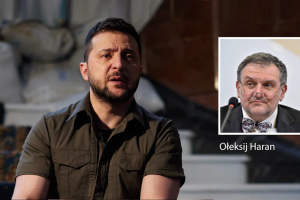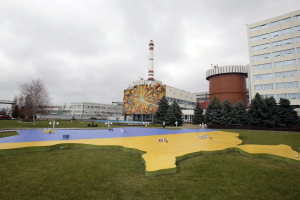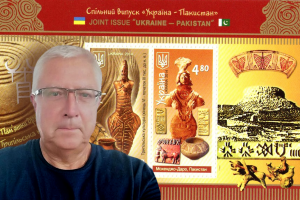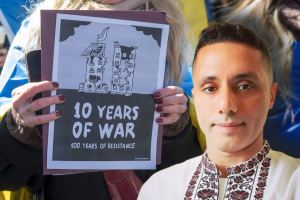Donbas can be leveled by populism
It is the fourth consecutive month that the pro-presidential regiment lost the information campaign in Donbas to the "Opposition Bloc." Results of the State’s communication policy monitoring in relation to Donbas in May - June 2018.

NGO “Media Detector” implements the monitoring of the State’s communication policy in relation to Donbas. Analytic reports are issued bimonthly. Monitoring methodology is available here. Project is realized with the support of the US National Endowment for Democracy (NED). Monitoring report for March-April 2017 is availablehere, for May-June – here, for July –August - here, for September – October - here, for November – December -here, for January –February 2018 – here and for March – April 2018 – here.
Monitoring of the State’s communication policy in relation to Donbas revealed the following tendencies in May - June of 2018:
- The President and his team are losing the information fight to the "Opposition Bloc" regarding the risks of "direct negotiations" with separatists and do not sufficiently explain the benefits of changing the Anti-Terrorist Operation to the Joint Force Operation;
- Potential presidential candidates Yulia Tymoshenko and Oleg Lyashko use the Donbas theme to instigate belief in their charisma and capacity to care about ordinary people.
The theme of International Peacekeeping contingent placement by the UN decision on the Donbas has remained as the key issue of communication of the President of Ukraine (17 mentions). Practically at every meeting and during talks with representatives of Western states, Poroshenko spoke about the need for the presence of peacekeepers as a guarantee of peace in Donbas. He also spoke about this during his telephone conversation with Putin.
At the same time, the issue of peacekeepers was virtually always discussed in connection with the release of hostages and prisoners (16 mentions), as a reminder of the aggression of Russia (14 mentions) and the need to preserve international sanctions (11 mentions). So we can state that, since the beginning of the year, the introduction of UN peacekeeping forces into the Donbas has become one of the main foreign policy goals of the President and his key message to the residents of the region.
In May, there was a change in the format of the Anti-Terrorist Operation for the Joint Forces Operation. This coincided with a period of significant deterioration of the security situation and an increase in the number of bombardments in de-occupied territory of the Donbas. It also influenced the rhetoric of the President: the number of references to the role of the army (12) increased by 50% compared to March – April.
However, these messages are more likely to sustain the President’s supporters rather than citizens living in the region where hostilities continue. During a trip to Donbas to introduce the new Head of the Donetsk MCA, President Poroshenko lost the opportunity to speak out clearly on this matter. Against the backdrop of increased Russian propaganda that intends to blame Ukraine for breaking the cease-fire and causing losses among the civilian population, the President’s reaction looks slow and insufficient. Only on May 31, during a trip to the Ivano-Frankivsk region, Poroshenko clearly indicated that he would never support the "hurray-patriotic idea of an adventurous military offensive that would take the lives of millions of Ukrainian heroes." However, his words were drowned out in the stream of sensational news surrounding Arkady Babchenko's case.
The government should talk more about the upcoming military and diplomatic efforts of Ukraine to stop the spread of Russian propaganda and rumors in Donbas, which undermine citizens' trust in the state. Now it will be the task of Oleksandr Kuts, the new Head of the Military Civilian Administration and ex-head of the regional administration of the SBU (Security Service). Interestingly, Kuts immediately said that he would not forget about residents of the occupied territories and will actively be engaged in the issues of setting up check points on the line of separation. In the following reviews, we will illustrate how he fulfills his promises, as well as the tasks posed to him by the President.
The Prime Minister makes statements that testify to the desire to play an independent political role
Starting in January Prime Minister Volodymyr Groysman began to use the Donbas theme to position himself as an independent politician, who makes and eventually fulfills promises. He has not always succeeded, but the Head of Government does not discard attempts to use the Donbas theme for his own political purposes.
In particular, on May 29 during a conversation with foreign journalists, Groysman repeated the position that “on the eastern border Ukraine protects democratic values." In order to illustrate the price of this, he touched upon the death of a girl who was killed by bombardment of separatists in Toretsk:
"Yesterday near Toretsk, after the bombardment of the Russians, a girl named Daria was killed. Three days before her death she turned 15; she only lived to the end of the 9th grade.
Daria was in the courtyard of her grandmother's house when an artillery shell landed. It broke three meters away from her, leaving no chance. The girl received extensive injuries and died on the spot.
How much more evidence do we need: the deaths of children and their parents, so that the whole world understands that Russia is a wild beast that should be put in a cell? This killer country does not care for people, not theirs, nor strangers’, tearing them down by thousands.
My sympathy for all her relatives. This terrible grief is impossible to imagine. "
What exactly did Groysman want to say? The words about the death of a child are written and pronounced in bureaucratic style, and the words about Russia - with emotion and metaphors, designed to draw the empathy of listeners. As a result, the Head of Government simply used the fact of human death to discredit the enemy in the same way Russian propaganda works using civilian victims in the occupied territories in order to show "Kievan governance" as "punitive" and "Nazi-like". As we see from the analysis of statements made by the Head of the Government, Groysman and his speech-writing team do not understand why this is a bad practice.
Avakov continues promoting his plan for the de-occupation of Donbas
In May - June, Arsen Avakov, Minister of Internal Affairs, focused on demonstrating that his draft plan for the de-occupation of Donbas corresponds to the interests of ordinary people. He emphasized this during his visit to Stanitsa Luhanska on May 5, stressing that the main task of his Ministry is to "ensure the order and quality of life" in "the territory that has suffered in recent years."
On May 10, Avakov demonstrated that experts of the Ministry of Internal Affairs are working on his plan of de-occupation. The Minister promised that the document would be made available to the general public during summer: "We must involve the public in discussing the plan and inform the population at every stage." And he said that "there is already a similar experience in such territories ... our experts solve not only the security issues, but even everyday issues of the local population".
On May 25, the Minister said that John Herbst, Director of the Atlantic Council (also the US Ambassador to Ukraine in 2004-2007), "appreciated" his "strategy of gradual reintegration". Again, the emphasis was placed on the fact that "every step must prove to citizens of Ukraine residing in Donbas that it is better to live in Ukraine than in an occupation regime.”
In June, during the IX National Expert Forum and in his article in Ukrainska Pravda, Avakov continued to promote certain theses of the peace plan, with a special emphasis on the need to pass laws on amnesty and collaborators. However, Donbas residents have heard nothing new compared to the March-April messages of the Minister.
MinTOT works in virtual reality space
In May-June we did not see any significant changes in the communications of the Ministry for Temporary Occupied Territories and Internally Displaced Persons. Five of nine messages related to Donbas were devoted to the interviews of the Minister Vadim Chernysh on "Radio HB", "Censor.Net" and the "Priamyj" TV channel. Nevertheless, in any of the messages the Minister did not say anything new concerning the most burning issues for the residents of Donbas.
Four other messages are grouped as follows:
• On June 4, a presentation on the assessment of the ecological and technogenic state of Donetsk and Luhansk oblasts was announced. Specific tasks for MinTOT are not included in this study;
• On June 5, the news about the Minister's working meeting with the Director of the Regional Office of the International Organization for Migration was posted. According to the results of the meeting, no concrete decisions were announced;
• On June 16 it was reported that the Minister participated in the celebration of the "fourth anniversary of the liberation of Mariupol from illegal armed groups", which included the transfer of hospital equipment and “keys for apartments” to 63 families of IDPs;
• On June 25 the allegedly “open source research” data on "actions that undermine the safety of society” was published." It is unclear which sources were analyzed, for what period, and which was the methodology of the research. Despite this, the Minister makes political statements about "radicalization of attitude."
We may state again that MinTOT’s communication about Donbas was related to promoting the personality of the Minister.
Donetsk MCA: Zhebrivsky was active in promoting President’s renome
In May - June, the chairman of the Donetsk Regional Military Civil Administration Pavlo Zhebrivsky did not change his style of communication: eleven out of twenty four messages were devoted to the opening and testing of various objects of socio-economic infrastructure, from the church in Volnovakha to the Center of Co-working and Economic Innovations in Slavyansk. At the same time, the chairman of the DonOMCA unusually often drew the attention of his team to the necessity of thorough execution of the orders and initiatives of the President, even when it concerned the construction of a "genuine civil society":
• During the MCA Medical Reform Board: "I emphasize once again that the reform initiated by the President should be implemented in the Donetsk region as soon as possible";
• During a meeting with educators: "Before September 1st, an inclusive resource center (IRC) should be established and opened in each community in Donetsk Oblast - city, district, UTC. Such a task was put before community leaders, in accordance with the educational policy implemented by the President of Ukraine Petro Poroshenko and fulfilling the government's decree ";
• During a meeting with representatives of NGOs: "We will build Ukraine only when the civil society actually emerges. And civil society is like "kurkul", these are youth associations and others who unite for the sake of Ukraine ".
In the end, before dismissal, Zhebrivsky managed to give his first assessment of his work in capacity of the head of the region: "We involved the Donetsk region into the uniform Ukrainian milieu. We opened primary schools, kindergartens, where children should feel that life is cool. We built roads, by which it’s possible to get to any area of the region... People should believe that they are building a modernized Ukraine. "
Nevertheless, Zhebrivsky did not confine himself to PR measures: in May, with the start of the Joint Force Operation, he visited the front-line settlements near Mariupol and Donetsk. As a result of the trips he initiated a number of specific tasks, the execution of which his successor will control. Will Alexander Kuts be capable of maintaining communication at the same level - let's see.
Luhansk MCA: Yuri Garbuz makes conclusions but avoids sensitive questions
On May 10, the head of the Luhansk Military-Civilian Administration reported on the results of his two-year work. However, instead of facts that would show the dynamics of change for better or worse, Yuri Garbuz voiced only spending committed by government agencies: for example, instead of information on the demining of territories, he announced how many millions were spent for rescuers to carry out such work; instead of the number of cured patients - the cost for the purchase of medical equipment and so on.
Similarly, during a meeting on the government's measures to tackle smuggling, there was no word about the problem of illegal trade with the occupied territories. And during a meeting with representatives of various Orthodox churches, there was no mention of the oppression of religious freedoms in the occupied territories and the position concerning Russian aggression from the Ukrainian Orthodox Church of the Moscow Patriarchate, which owns most of the churches of the region. The same is true when communicating with miners: instead of concrete commitments to help - promises to submit draft decisions to the Ministry of Energy. Among positive change are only reports on improving the conditions of work of doctors in Milov and setting up street lighting in 50 settlements. However, there is no word about the investigation of resonant killings, the restoration of housing in Svyatov, the arrangement of the checkpoint in Stanytsya Luhanska, the launch of the stable work of Severodonetsk Azot and stable supply of energy in the whole region. All of these unfulfilled promises not only indicate problems in the work of the MCA, but also show the level of damage in trust of the government caused by the empty promises of authorities.
First Deputy of the Chairman of the Verkhovna Rada of Ukraine Iryna Gerashchenko: reports about “achievements” that reveal real failures
The majority of Gerashchenko's messages in May-June were devoted to the release of hostages and prisoners (nineteen out of twenty seven). Two more reports concerned the deaths of civilians as a result of the separatist bombings. The other post was used by Gerashchenko to praise MinTOT for the program of assistance in providing housing for IDPs.
Later on, the first deputy of the Chairman of the Verkhovna Rada reported about her contribution to the struggle for the Ukrainian Donbas. Undoubtedly, those small changes that Gerashchenko managed to implement focusing on improving the lives of the residents of Donbas ("to eliminate certain violations of the rights of property of the IDPs when importing things through the CPMB, to remove obstacles to the restoration of pension and other social payments to the residents of Travneve and Gladosov") are worthy of respect. However, the report also contains information that is more likely to indicate the ineffectiveness of the authorities: "Together with colleagues, Maria Ionova and Irina Lutsenko, this year we transferred to 72 OBMr," Black Zaporozhians ", 10 OGshBr, and other brigades the necessary equipment, in particular, laptops, printers and televisions , washing machines, electric and oil heaters, gas stations, microwave ovens, induction cookers, building materials for bunkers and fortifications, and others (we collected this humanitarian assistance together with colleagues from the BPP and friends who have supported the Ukrainian army since 2014). As part of a charity action initiated by the State Committee for Television and Radio Broadcasting, "Library for Donbas", more than 500 books were donated to the schools and local libraries of Donbas, as well as to military units (thanks to Oleg Nalivayko). And in just four years the best Ukrainian publishers handed more than 35 thousand books to military brigades, hospitals, schools, and high schools of Donbas!" It is unlikely that providing troops in the combat zone with the necessary equipment or providing 500 (!) books to schools and libraries of the entire free Donbas is an achievement. This rather shows that the executive branch of power (Ministry of Defense, Ministry of Culture and Ministry of Education) do not perform basic tasks in the conflict zone, and Ukrainian military and civil servants still need "humanitarian aid". It is surprising, therefore, that Gerashchenko, with her experience in the region, provides such information without criticism and an appealing to the authorities to correct the mistakes made.
Gerashchenko’s most important message from the point of view of the future peaceful settlement was released on May 30, commenting on the progress of the talks in Minsk: "Any speculations about direct talks with Donetsk and Luhansk are not about peace, but about capitulating according to the scenario of Kremlin. That will not happen”. She repeated this argument in an interview with Channel 5.
The next day, the President also clearly outlined the limits of Ukraine's possible actions regarding the occupied territories. However, Gerashchenko, like her political “patron”, for some reason did not underline the importance of her words and did not repeat this view in June to counter Russian propaganda.
The “Opposition Bloc” promotes a position about “peace by any price”, and “Solidarity” put the whole burden of work regarding Donbas on its leader‘s shoulders
Meanwhile, the Opposition Bloc has circulated at least 16 notifications about the need for "direct talks" with Russia and dissenters for the sake of peace: Yuri Boyko - eight, Vadim Novinsky - three, Alexander Vilkul - two, Sergei Lyovochkin - two, “Opposition bloc” - one statement.
The second most important topic was protection of the rights of IDPs and victims of armed conflict (15): Natalia Korolevska - ten messages, Yuri Boyko - five. At the same time, Korolevska turned to the women's audience first and Boyko to the widest circle, emphasizing the Opposition Bloc’s legislative activity.
However, the pro-presidential "Solidarity" party, which has not entered into an information fight with its opponents that have already for a month directly attacked the President's policy and spread the position of "peace at any costs", which is reported to be supported by at least 30.5% of the residents of the South, 23% -of the East, 25,5% of the residents of Donbas. Instead, the majority of messages from the Solidarity deputies concerned the release of hostages (ten reports, lead by Gerashchenko again), and the introduction of a peacekeeping contingent to Donbas (four messages), the rights of IDPs affected by hostilities, and residents of occupied territories (three posts together).
For the fourth consecutive month, the pro-presidential force lost the information campaign in Donbas to the "Opposition Bloc."
Tymoshenko, Yatsenyuk and Lyashko use Donbas issues to their own benefit
Other political forces continue to raise the issue of Donbas in their political statements in order to achieve their own purposes.
For example, the leader of the People's Front, Arseniy Yatsenyuk, connects the voting of residents in occupied territories with Russia's interference in Ukraine's internal affairs and "increasing its political presence in the country's highest legislative body." However, this position directly contradicts Avakov's statement that "60% of people in the occupied territories want to return to Ukraine." So, we may see that either there are serious discrepancies within the "People's Front", or politicians in this way compete for the support of different groups of voters.
Meanwhile, "Batkivchshyna" once places its stake on the charisma of its leader and belief in her as a guarantee to solve all problems, including the end of the war. So, the People's Deputy from “Batkivchshyna", Sergiy Vlasenko, appearing on the channel News One, practically called on voters to simply believe that "only a new President can bring peace to Ukraine." Yulia Tymoshenko has developed this position herself during the forum "New Course of Ukraine": "I firmly know how and with whom to negotiate peace. I will be stopped by neither anyone’s business projects that are made on blood, nor any collateral arrangements that are being conducted today”. However, the leader of the "Batkivchshyna" failed to provide more concrete steps or at least a sketch of her plan, as Avakov and Poroshenko have done.
"Samopomich" also does not try to win the trust of the region’s residents: continuing discussion about smuggling restoration after the change of the anti-terrorist operation to the JFO and the inappropriateness of the UN peacekeeping forces on Donbas. There are no alternative proposals from Samopomich.
In the given environment the leader of the Radical Party, Oleg Lyashko, looks the most advantageous in the eyes of local residents. He is able to fill even the smallest affairs with positive messages, which resonate with the expectations of the war-torn region. By the way, Rinat Akhmetov's charitable teams work with the same emphasis:
• Thanks to Lyashko, the Center of Artistic and Aesthetic Creativity is repaired in Mariupol: "For its reconstruction ... he tapped out more than 10 million hryvnias from the state budget ..." “My task is to create all conditions for the development of children, to pull them out of the street so that they spend time in the stadiums and in artistic schools, and not wandering in cafes with alcohol. Ukraine needs new talents. A successful nation that cares about the health and education of its children. I want our nation to be the most successful. To invest money not in prisons, but in schools, kindergartens, stadiums";
• Lyashko: Mariupol residents should not feel detached from Ukraine: "Everyone who goes from Zaporizhzhya to Mariupol knows that there are no roads. We are doing our best to make the road to Mariupol ... Mariupol will become an example of how we should take care of people's life and health ";
• "Illichivtsi (Illichivets plant workers)" thank Lyashko for the "metallurgical" law: "Last year, when I came here, your plant stood idle for 2-3 months, because there was neither raw material nor normal railway connections. Thanks to our "metallurgical" law, there is raw material, and therefore - work and salaries ";
• In a village of the Luhansk oblast, with the assistance of Oleg Lyashko, they installed a dome in the church: "This locality, where Oleg Valeryevich's mother was born, where he spent his youth, is under the special care of the leader of the RP. He ... brought a lot of important gifts ... the “Iron Team” of Lyashko’s Radical Party is struggling in the Parliament to allocate nearly 6 million hryvnias for the needs of the village of Lysine this year."








